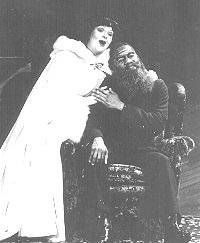
This is a wondrous tale adapted from the play by Ostrovsky and beautifully
staged by the Guildhall School of Music & Drama with flair and elan.
The youthfulness and freshness of the performers added to the delight of
this staging. The standard of presentation, both visual and musical, bears
comparison with the fare at many world-renowned operatic venues. Indeed,
by relying upon imagination, and turning the limits on finance and stage
space to advantage, the Guildhall has regularly left images of sound and
sight that stay in the memory longer than some more pretentious and other
more conventional productions.
Snegurochka is famous for its abundance of folk song, original and composed, and Clive Timms will feel well-rewarded that his English translation was so well heard; I cannot remember another opera-in-English where virtually all the words were so easily audible - all credit to the coaches and some also to the composer.

There were no conspicuous weaknesses amongst the soloists, and all the students
involved have reason to be proud of having participated. On March 10 we saw
the second of the two who alternated in the title role. Natasha Jouhl
's voice and appearance made the Snowmaiden sparkle like snow on a sunny
winters day. An uncanny broad impassive, passionless smile was well judged
and created a warning signal that all is not as it should be. Woe-betide
any young man who should become so fascinated by her beauty and smile as
to be unable to read the danger signs. (Our picture provided by GSMD
[© Laurence Burns]
of Father Frost with his daughter Snegurochka has the
other Snowmaiden, Sarah Redgwick.)
The Snowmaiden was the result of a mismatched union between Frost and Spring. The sun god Yarilo was offended, and a cycle of nature ensued which had been lasting 16 years since the birth of the Snowmaiden. During this time Frost held his icy grip over Spring. Barry Martin was impressive as Frost and also doubled as a Boyar in the Tsar's retinue.
The lovely figure of Spring was sung with exquisite tone and poise by Estelle Kaique. She set the scene wrapped in fur collar and muff, shivering like the dancing birds which surrounded and tended her, subtly characterised by posture and minimal gestures. They tried dancing to help them keep warm, 'as the humans do'. However, and crucially, something more was needed.
The bond between winter and spring must be broken. The symbol of that bond, the Snowmaiden, must perish so that the burgeoning powers of nature and renewal can be released. Renewal of life, fertility in land and creatures are all important. The young man, Mizguir, who misguidedly rejects the warm blooded Kupava (dressed in sumptuous red) standing for life and fertility and, instead, becomes obsessed with winter's beauty, the Snowmaiden, is doomed to perdition. Crucially, he is a rich merchant and as such not intimately connected and directly dependent on the land and, therefore, lacks knowledge and insight to assure his own survival. He was memorably characterised by Hakan Vramsmo in his rapidly changing circumstances and moods. By contrast Lyel, the young shepherd, who is also fascinated by the Snowmaiden, instinctively retreats from her. He is knowing and sensible and opts for the mature, sensuous Kupava instead. The part of Lyel was sung with youthful elan by Alenka Ponjavic, who began hesitantly but was well in her stride for the later acts .
This story must have made full sense to a people whose folk memory was periodically refreshed by very real hunger and starvation if natural, ecological balances became disturbed by unpropitious weather patterns. Woven into this matrix are allusions about the necessity of letting go so as not to impede survival, physical or emotional. There is the need to let go of an unsuitable partner, the need for parents to let go of their children and of the young to let go of childhood in order to enter maturity, which includes sexual maturity and procreational responsibility. Sadly the Snowmaiden cannot fulfil these. Her heart of ice is doomed to melt if it is exposed to the sun; the power of love and melting spells death. There is sadness at the sacrificial passing away of this wondrous beauty of winter but rejoicing that the warmth of the sun and love are once again permeating all of nature.
Rimski-Korsakov had a special affection for this work and considered it among his best. This feeling can be readily understood in the context of the importance of culture in supporting the great efforts at social, political and economic reforms in Russia. The emancipation of the serfs is just one of the better-known 19th century efforts to align Russia's social model more closely with a Western European one. This had required a new consciousness about the common people as an asset (needed for industrialisation). It was, therefore, culturally astute of Rimski-Korsakov to put ordinary folk front stage and he was right to be proud of his achievement.
Elliot Goldie as Bobil and Gudrun Johanna Olafsdottir as Bobilicha, the peasant couple who, for a short time, acted as the the Snowmaiden's foster parents, were beautifully sung and characterised. Andrew Rees, a young singer as they all were, gave a memorable performance as Tsar Berendei, old and doddery but still retaining a keen interest in the proceedings and giving his blessings to the outcome, and to all the couples ready to provide him with lots more little people! The people of Berendei had an important and invigorating presence. The lusty chorus played a central role and the dancing and acrobatics by the versatile cast was enormously exciting.
This Guildhall School of Music & Drama production, under the expert direction of Stephen Medcalf, does full justice to this fascinating work. Helped by Isabella Bywater (the ingenious set designs), Sophie Bugeaud (costumes), Maxine Braham, (choreography) and Simon Corder (lighting) the team achieved a memorable, endearing, and thought provoking presentation. Clive Timms, Head of Opera Studies, brought clarity and finely judged pacing to the musical interpretation with a very high standard of instrumental playing from the multi-national instrumentalists in the orchestra.
A great evening, the only regret is that there were so few performances.
Alexa Woolf
 Return to:
Return to: